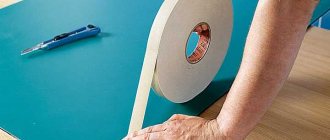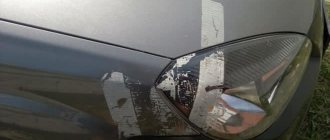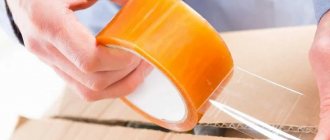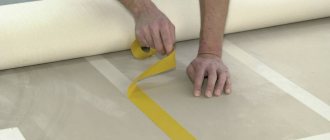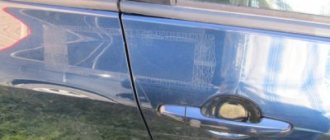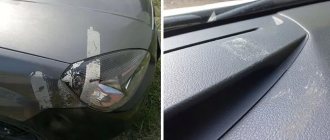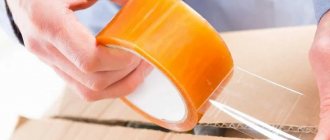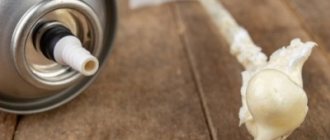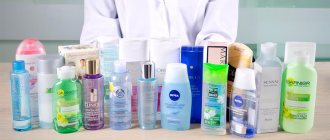If you need to glue something to a flat surface as quickly as possible, we recommend using regular or double-sided tape. Gluing it is not a problem, but few people think about how to peel it off without leaving a mark or damaging the surface. Today we will tell you how to remove tape as quickly and easily as possible.
It is quite durable and can withstand light loads well. In addition, it is invisible and does not spoil the appearance of the surface. This strength is achieved through the use of acrylic glue. The problem is that it leaves marks and the tape will not be so easy to peel off. The choice of method and means depends on the material on which the tape is glued.
How to peel double-sided tape from glass?
To do this you will need something sharp, for example a knife. But in this case you need to act as carefully as possible, otherwise scratches will remain on the glass.
If you are afraid of leaving a mark on the surface, use medical alcohol or a product intended for windows and mirrors. Apply the product to the alcohol, leave for 10 minutes, then wipe off with the hard side of the sponge.
Check out our publication How to remove polyurethane foam from a surface: methods
Wall, doors.
The easiest way is to use a hairdryer. Turn it on to maximum temperature and start heating the tape at a distance of 10 cm. High temperature will soften it. After 5-7 minutes, pry it with a knife and remove it. Remove the sticky layer with a soap solution and a sponge.
Another way to remove tape from walls or doors is to prepare a vinegar-soap solution. Mix 250 ml of water, 50 ml of vinegar and a teaspoon of liquid soap. Mix, apply with a sponge to the surface, wait 5-10 minutes.
Paper wallpaper. To avoid removing the paper and damaging the wallpaper, you must first warm up the tape. Cover the tape with a thin cloth. Heat the iron, then run it over the fabric several times. Remove it and remove the tape with something sharp. You can remove the remaining sticky layer with alcohol.
How to peel off tape from plastic quickly and easily?
These methods can be used not only for plastic, but also for ceramics.
Method number 1:
put another layer of tape on top of the tape, then tear it off by the edge as quickly as possible.
Method number 2:
vegetable oil (you can use any oil you have on hand). Apply to the desired area, remove after 10-15 minutes with a paper towel or sponge.
Method No. 3
: soap solution. Mix 100 ml hot water and 1 teaspoon crushed soap. Stir until dissolved, apply with a sponge to the tape, leave for 5 minutes and remove. Instead of soap solution, you can use dishwashing detergent.
For plastic surfaces, regular medical alcohol or even vodka will do.
How to remove tape from the refrigerator?
It is important not to leave any scratches when removing the adhesive tape. Mix regular baking soda with a little water. The result should be a paste-like mixture. Dampen a piece of cloth in it and apply to the surface for 3-4 minutes, wipe and remove any remaining glue.
Instead of soda, you can use vegetable oil; after 10-15 minutes, remove it along with the remaining tape.
Some sources recommend using a razor blade. We advise against doing this as there is a high risk of leaving scratches.
How to remove tape with an eraser?
Surprisingly, this method really works well. But it can not be used for all surfaces, but only for plastic and wood. Rub the eraser over the area with the tape several times. We recommend using an elastic band with a firm and fairly rigid texture. Wipe the treated area with a damp cloth.
How to peel double-sided tape from various surfaces? We have presented you with several effective methods to get rid of tape as quickly and easily as possible. Be sure to take into account the factor with which surface you will be working.
Men's site site
Scotch tape is actively used not only during repair work, but also for office and household purposes. However, not everyone knows how to peel off tape quickly and efficiently without the help of professionals. In addition to securely fixing objects or parts, tape can leave behind traces that need to be gotten rid of. In order not to spoil the surface of wallpaper, furniture and other objects, you need to peel off the tape correctly.
Peel off regular tape
In every home you can find a large number of plastic items. To remove the tape from the plastic carefully and without leaving a trace, you will need to prepare:
- solvent, you can choose gasoline;
- stationery eraser;
- vegetable oil;
How to remove tape from plastic
Using ordinary vegetable oil, you can quickly and effectively remove tape and all unpleasant traces of it.
To do this you need to do the following:
- After you have torn off the tape from the plastic surface, you must immediately treat the problem area with vegetable oil using a lint-free cloth. If it is possible to leave a napkin with oil on the problem area, it is recommended to wait at least 2 hours. After removing the tape from the plastic, you need to wash the surface of the product with a soap solution.
- You can use an eraser to remove tape and traces of it from glass surfaces, furniture and other objects. This method will help with old marks. Simply rub the problem area with an eraser. The resulting debris should be removed with a brush or vacuum cleaner. However, it is worth considering that the process will take a lot of time.
- Solvent or filtered gasoline perfectly removes tape and traces of it from plastic surfaces. It is necessary to perform the following steps: take a cotton pad, moisten it in the specified product, and treat the problem area. The procedure must be performed with gloves. Before using these aggressive agents, you should test their effect on an inconspicuous area of the product.
- If you used adhesive tape to insulate windows, then you cannot do without the help of a hairdryer. It is necessary to warm up the tape and tear it off the surface.
The listed methods perfectly remove tape from plastic surfaces.
How to remove tape from furniture
Scotch tape is used when transporting furniture, so it must be disposed of correctly.
- If the surface of the furniture is polished, it is recommended to use vegetable oil.
- Filtered gasoline can be used to clean any type of furniture, but be aware that it can damage painted or polished items.
Let there not be a trace left on your furniture from the use of adhesive tape!
How to clean tape from a refrigerator
Advertising stickers and adhesive pieces of protective film remaining on household appliances can be removed when purchased directly in the store. In household appliance stores there are special pencils and liquids that allow you to both remove tape from a washing machine or a new refrigerator and clean up traces of it. If you haven’t thought about it in advance, you’ll have to spend a little time. To the means already known to us are added:
- Acetone
- Alcohol or vinegar
- Window cleaner
The same substances are suitable for removing adhesive stains from glass, mirrors, ceramics, and tiles.
How to peel off double-sided tape
Double-sided tape is highly durable compared to regular adhesive tape. Traces from this type of tape cause a lot of trouble. It's easy to get rid of this problem.
- You need to use solvent, gasoline, kerosene or regular alcohol.
- You can use a rubber attachment designed for power tools.
- Add a cotton napkin.
- Vegetable oil.
A hairdryer will perfectly remove traces of double-sided tape. It is enough to warm up the problem area, then remove the tape. After removing the tape, it is recommended to treat the dirty area with a lint-free cloth.
Using vegetable oil is a way out of this situation. This method is appropriate to use if the surface cannot be exposed to high temperatures. Use a cotton pad soaked in oil to rub the problem area. After the procedure, wash the area with soapy water. You can use dishwashing detergent.
You can use various chemicals for household use. They contain components that can easily remove traces of tape from various surfaces.
It’s easy to remove tape from wallpaper and other surfaces using available tools.
- If you can use more aggressive methods of removing the tape, then using a rubber nozzle will do. This method is recommended for use when large areas need to be cleaned. The attachment is put on the drill, then traces of adhesive tape are removed with its help. You can purchase a drill attachment at a specialized store.
- If you need to remove tape and tape marks from glass, you can use a powerful car cleaner. The first stage of the procedure will be to remove the base using a thin knife, then take a napkin and moisten it in the prepared product.
- You can remove tape from plastic, glass and other surfaces using nail remover. You will need to wipe the problem area with a napkin. After the procedure, you need to rinse the cleaned area.
Professionals recommend not to delay the procedure of peeling off the tape from different surfaces, otherwise the contamination will be difficult to remove. This is explained by the fact that the adhesive base of the tape becomes soldered to the surface over time, so it will be difficult to cope with the problem.
There is no need to rush when removing the tape. It is necessary to test each product used on an inconspicuous area of glass, plastic and other surfaces.
Today, various types of adhesive tape are produced, some of which are intended for subsequent removal. Manufacturers use an adhesive base that will even remove itself over time. To remove such tape, simply pull out the edge of the tape. After removing the tape, not a trace will remain on the surface of the product.
Scotch tape is used by builders, schoolchildren and housewives, so it is important to be able to remove adhesive tape from any surface without much effort or harm to the product.
The method for removing double-sided tape depends on the surface it was applied to. The difficulty is that the tape is coated with acrylic glue, which leaves sticky marks. Available means in the form of solvents, vegetable oils or a hair dryer can help remove the tape. Each surface has its own method depending on the material from which it is made.
- Show all
How to remove?
Before you begin removing double-sided tape, you must carefully read the instructions and removal tips, because any careless movement can ruin the surface on which traces of the tape are located.
There are dozens, maybe hundreds of methods for removing adhesive marks, but the most effective ones are revealed below. Let's look at each of them in more detail.
Stationery knife
The method is simple, but it is permissible to use it if the likelihood of scratching the surface is minimal . Proceed with caution.
The paper or film base is pryed off with a blade. The loose edge of the tape can be easily torn off by hand.
If it was not possible to remove all the adhesive tape at once, and pieces remain, you need to lift the edge of the adhesive tape again with the tip of a knife, and so on until it is completely removed.
Rubber (caoutchouc) disc
A soft attachment for a drill or screwdriver will help you cut off adhesive tape from a large area . The rubber disc will remove the top sticky layer without leaving scratches on the surface.
The tool must be set to minimum speed. Plastic rubber will not harm even the paintwork.
Hairdryer
Glue heated to 80-100°C is removed faster. You can use either a hair dryer or a hair dryer to dry your hair. They can be replaced with an iron set to the minimum temperature.
It is necessary to better warm up the edges of the adhesive tape. If they come off easily, the rest of the paper will come off easily. It is more convenient to do this with a plastic spatula or a dry cloth.
The advantage of this method is the absence of scratches even on paper . The most tightly attached tape can be removed without difficulty.
But there is no need to heat non-heat-resistant objects to high temperatures, especially with a powerful hair dryer - they will immediately deform. It is better to expose them to the sun for a short time or keep them under steam - the glue will noticeably soften.
Oil
The glue will easily slide off if you lubricate the area of contamination with vegetable or essential (for example, eucalyptus) oil . They contain organic unsaturated acids that can dilute polymers:
Wipe the sticky surface with a sponge and leave for several hours.- You can lay a rag soaked in oil on a horizontal tabletop or bedside table for about 20 minutes.
- If the stain is stubborn, it is best to leave the greased stain on overnight. In the morning the stain will come off without effort.
- All that remains is to wash off the oil. Easy to clean surfaces (glass, polished furniture, plastic) do not absorb grease, so there will be no problems.
This method is not acceptable for paper wallpaper.
Eraser
If you rub the remaining glue with a regular eraser, it will form pellets and come off easily . Just rub it with a cloth.
In a similar way, you can remove tape from furniture, plastic or glass. But, if the stain covers a significant area, it is better to use gasoline, white spirit or acetone.
Gasoline, acetone, white spirit
The main advantage of the method is the ease and speed of removal:
It is necessary to moisten a rag in any of the existing types of solvents and rub the stain.- The type of surface should be taken into account.
Regular gasoline can leave behind greasy stains. It is better to replace it with a highly purified composition, for example, liquid intended for refilling Zippo lighters. - Acetone easily dissolves paint and varnish, so it is not recommended to use it for cleaning furniture. The same goes for removing stains on wallpaper.
- White spirit is used to treat any type of surface, with the exception of those painted with unstable dyes.
Glass cleaning liquid
Most of them are made with alcohol, which is an excellent solvent.:
- You need to rub the stain with a sponge or rag soaked in this mixture, and after a couple of minutes there will be no trace of the sticky stain.
- You can replace the windshield wiper with regular drinking alcohol or ammonia. They can even cope with dried out, old stains.
- More serious products are car glass cleaners. But it should be noted that, in addition to alcohol, they contain quite strong chemicals and ammonia.
Table vinegar or citric acid
Any acid can dissolve glue . In everyday life, vinegar or lemon is more often used.
You should rub the contaminated area with citric acid soaked in table vinegar or diluted water, and the dirt will easily come off.
This method has a significant advantage: the acid does not leave streaks . The smell of vinegar will disappear in just half an hour.
Baking soda
The procedure is acceptable for hard surfaces such as plastic or tiles. After all, particles of soda are, albeit small, an abrasive that can leave scratches. This method is not suitable for cleaning furniture and especially wallpaper.
It is necessary to prepare a mixture of soda and hot water and apply this paste to the surface with a sponge or rag, and then rub.
The glue will quickly form into pellets. It is permissible to replace soda with tooth powder .
From walls and doors
There are several ways to peel double-sided tape from the surface of a wall or door:
- 1. Using a hair dryer. The device is turned on to maximum mode and kept at a distance of several centimeters from the tape. The hot air flow is directed through the center and towards the edges of the adhesive tape. After softening the adhesive layer, use a knife to pry off the film and remove it. If part of the layer remains, it is removed using a sponge dipped in soapy water.
- 2. Using vinegar, water and soap. Take water - 275 ml, vinegar - 60 ml, liquid soap - a few drops. Make circular movements with a wet sponge.
- 3. Using an eraser. The rubber is wetted and the surface is wiped with it. The eraser acts as an abrasive on wood, furniture and walls.
From plastic and ceramic tiles
You can remove tape from plastic and ceramic tiles using ordinary, accessible means:
- 1. Another adhesive tape, which is applied to the first and torn off with a sharp movement.
- 2. Vegetable oil using a sponge. It is applied to contaminated plastic and removed with a paper towel after 10 minutes.
- 3. Medical alcohol. When applied to the surface, greasy stains are also removed.
- 4. Eraser. You can rub the surface with it and then remove the dirt with a damp cloth.
- 5. Hot soapy water. It removes glue residue well.
- 6. Dishwashing liquid.
- 7. Heating. A hairdryer will also work here.
It should be remembered that when working with a hairdryer, you need to set a moderate speed setting, because the surface of the plastic may deteriorate.
What is prohibited from removing tape from wallpaper?
Paper is a fragile material, so some products that are effective for other surfaces are not at all suitable for wallpaper.
It is not recommended to use:
- Vegetable or baby oil. Paper wallpaper will absorb the oil, leaving a greasy stain. Therefore, this method is only suitable for hard surfaces.
- Essential oil . Such oil evaporates quickly from surfaces, but the resins included in its composition will also leave a greasy stain and damage the paper.
- Gasoline, kerosene or white spirit . These solvents are very powerful and leave marks even on hard surfaces. In addition, these liquids are toxic and flammable and are unsafe to use.
- Detergents (such as dishwashing liquid or soap solution). These products may damage the paper layer. However, they can be used with caution when cleaning wallpaper with increased detergency (i.e. water-resistant).
- Cleaning powders or soda . They remove adhesive from adhesive tape due to mechanical action, such as abrasives, as well as chemical ones. But they are completely unsuitable for paper wallpaper, because they will scratch their delicate surface and damage the design.
- Products designed to remove labels . They are sold in stores and come in the form of a pencil, spray or liquid. Using them, you can damage the wallpaper layer, since they are designed specifically for removing paper.
From the refrigerator
Remove adhesive tape from the refrigerator in the following ways:
- 1. Using vinegar. If the traces of tape are not removed the first time, apply the product to the refrigerator and leave for an hour. Then wipe with a dry cloth.
- 2. Using soda. It is mixed with water to form a paste. A rag is soaked in the solution and traces of glue are removed.
- 3. Baby oil. A few drops are applied to the surface of the refrigerator. Then wipe it with a rag.
- 4. Razor blade.
The razor must be used very carefully. Any wrong movement will result in scratches on the refrigerator.
How to remove marks from masking tape
When choosing a method for cleaning marks from masking tape, it is necessary to take into account the type of material, since glass, plastic and wood react differently to external influences.
Cleaning plastic
To remove remaining masking tape from plastic, you will need:
- Mix a tablespoon of baking soda and water together to form a mushy substance.
- Apply the mixture to the contaminated surface.
- Wait no more than three minutes and rinse with water.
The composition of the described mass includes an abrasive substance. Therefore, rubbing such a paste into a plastic surface is prohibited.
To quickly remove tape residue, use a school eraser. A similar effect is achieved by a specialized product for removing glue from plastic. You can also use toothpaste to remove traces of masking tape. Using a sponge (rag), apply this cleaning agent to the contaminated area, wait 5 minutes and rinse with water.
Metal cleaning
Kerosene, white spirit, acetone and gasoline help remove masking tape residue from metal. To remove stains you need:
- Wet a rag in any of the following liquids.
- Rub away any remaining adhesive tape until the marks disappear.
- Wash the surface with a cloth dampened in clean water.
Having chosen these solvents to remove traces of glue, you must use protective gloves and open the window for ventilation. If metal comes into contact with plastic, then the latter must be covered with plastic film.
The second method for cleaning masking tape marks will require refrigerant. This substance is sold in cans in hardware stores. To remove masking tape from metal surfaces, you need to:
- Spray the refrigerant at a distance of 10–15 cm, holding the can for 3–4 seconds.
- Using a rubber spatula, scrub the contaminated area. If necessary, you need to re-spray the spray.
- Wipe the surface with a damp cloth.
To remove remnants of adhesive tape from a metal surface, specialized products are used that not only remove dirt, but also restore the former shine of the material.
Glass cleaning
To help remove traces of tape from glass:
- acetone;
- petrol;
- nail polish remover;
- alcohol;
- Window cleaner that contains alcohol.
To clean the glass, each of these liquids must be applied to the contaminated area, wait no more than a minute and wipe with the hard side of the foam sponge.
Newly glued masking tapes can be removed using another tape, which must be applied and leveled on the back of the strip and pulled sharply towards you.
Old marks can be removed with a hairdryer in combination with baking soda. To do this, you must first heat the contaminated area. Then you need to place a tablespoon of soda in water until it becomes a paste, apply the mixture to the glue with a sponge and wipe off the remaining tape.
Cleaning wood
Regardless of the type of wood surface, the following method is used to clean remaining adhesive tape:
- Apply 2-3 drops of sunflower oil to the sponge.
- Use a sponge to wipe away traces of adhesive tape.
- Wait 30 minutes and wipe the surface with a terry (paper) towel.
- Mix a teaspoon of detergent (it is recommended to use aggressive detergent) and a glass of table vinegar.
- Pour the mixture into a spray bottle, shake and apply to the contaminated area.
- Wait a minute and remove any remaining oil with a paper towel.
Wood that is not covered with varnish or paint can be cleaned first with a hard sponge and then with fine-grained sandpaper.
When removing painter's tape from furniture, follow the manufacturer's recommendations. In order not to spoil the product, the contaminated area must first be wiped with a school eraser. If this method does not bring results, you can apply essential oil to the remaining glue, wait 5 minutes and remove with a soft sponge. After this procedure, the surface must be wiped with a damp cloth.
Despite the fact that the adhesive from masking tape penetrates deeply into the structure of the material, you can remove residue from the tape using household products. It is necessary to take into account what the contaminated surface is made of and select cleaning methods accordingly.
From paper and wallpaper
You can again remove tape from paper and wallpaper using a hairdryer. To do this, a stream of hot air is directed to the surface. With your other hand, you slowly peel the tape off the paper. As it unsticks, the air stream is directed to the place of separation. Gradually all the paper will be cleared.
Double-sided tape is indispensable in the household. However, along with its positive characteristics, it has one drawback - it is not easy to remove. Each time you have to do a lot of trial and error before the adhesive base gives in. How to effectively remove double-sided tape? We offer you some tips that will help you deal with leftover tape quickly and efficiently.
Methods for removing double-sided tape from different surfaces
Today, many ways have been found to deal with the remnants of double-sided tape. For surfaces that can be easily damaged, gentle cleaning methods are used; for surfaces that are resistant to damage, more intensive cleaning methods are used.
Damage and chemical resistant surfaces:
- car body;
- glass (windows, excluding plastic parts);
- metal;
- ceramic tile;
- rubber.
Easily damaged surfaces:
- plastic;
- furniture;
- linoleum;
- laminate;
- paintwork;
- car wind deflectors.
Among the effective methods there are both original ones, invented by inquisitive minds at home, and special technical and chemical methods of industrial production.
From walls and doors
The choice of means for removing double-sided tape depends on the type of surface on which it was glued. To remove glue residue from walls and doors, you can use several methods:
- Hairdryer
_ Direct a medium to high blast of hot air onto the tape. Pay special attention to edges and corners. After a few minutes, the adhesive base will soften. Try to pry the edges of the tape and carefully peel it off. Use a knife or scraper for this. Use a hair dryer until the tape is completely removed. Remove the remaining thin film with a sponge soaked in warm soapy water. - A solution of water, soap and vinegar
. Mix 1 tbsp. water, 60 ml of vinegar and 3-4 drops of liquid soap. Dip a sponge in the prepared solution and rub the wall or door in a circular motion. Make sure that the solution does not discolor the surface. - Melamine sponge
. Wet a sponge with water and scrub the area with the tape until it disappears completely. Melamine is a mild abrasive that is safe for walls and doors. However, it is not recommended to use such a sponge on glass and polished surfaces. Do not scrub too hard as this may discolor the area being scrubbed.
From glass
Do not use heat from a hairdryer or abrasives to remove tape from glass. They can cause cracks and scratches. Before you begin removal, have the following materials ready: glass cleaner, a mild knife, cooking or mineral oil (such as Goo Gone), rubbing alcohol, and a soft sponge.
To remove tape from glass, do not use heat from a hairdryer or abrasives.
Remove most of the tape by prying it up with your fingernails, a knife, or a spatula. Do this carefully, being careful not to scratch the glass. Spray the remaining tape with glass cleaner. A substitute for a cleaner can be a product you prepare yourself. Mix 1.5 tbsp. water, 60 ml of vinegar and a few drops of liquid soap. Wipe the wetted area with a sponge in a circular motion. So that the remaining tape can be easily removed, soak it in the prepared oil. Leave it on for a few minutes and then scrub gently with a sponge.
Moisten a soft cloth with alcohol and treat the oil-soaked area. If after these procedures there are still stains of tape, repeat the treatment with oil and alcohol again. Spray glass surface with glass cleaner and wipe dry.
What products spoil the surface?
When removing adhesive strips, try to remove the adhesive and preserve the coating. Solvents that completely remove stains from double-sided tapes on one base easily damage another. Therefore, for processing, do not use devices and cleaners that are potentially dangerous for a specific material:
- for plastics - concentrated acids or alkalis; ethyl acetate; chlorine bleaches;
- mirrors and glass are not cleaned with rough brushes or heated with a hairdryer;
- porous surfaces are not rubbed with sand;
- enemies of painted metal - gasoline, abrasive powders, acetone;
- the paper is not wetted with water;
- racks made of fiberboard and chipboard are not treated with steam;
- Unpainted wood should not be rubbed with vegetable oil.
Before you start removing tape from upholstered furniture or polished cabinets, the effect of the substance is tested on a hidden corner. If the coating does not discolor or deform, proceed to complete cleaning. This rule also applies for other reasons. Do not rub delicate materials with hard brushes, knives or metal scrapers.
The effect of any product is first checked on an inconspicuous area
Additional Information! Acetone and solutions containing this organic compound often increase the area of contamination, so liquids are applied carefully, trying not to go beyond the boundaries of the area being cleaned.
From other surfaces
To remove tape from cardboard, paper, plastic and other surfaces, it is necessary to take into account the properties of the material. It is better to remove adhesive tape from paper and cardboard by heating. However, when working with photographs, be careful not to let the hot air damage them.
Clean tape from plastic using olive oil or specially developed Goo Gone and Goof Off products. Pour some oil onto the tape and leave for a couple of minutes. Remove any remaining residue with a rough sponge. Do not use this method on paper, cardboard or fabric.
Acetone and nail polish remover work well for removing tape. They evaporate easily and do not leave stains. But they should not be used on painted and plastic surfaces, since, together with the tape, they can remove the paint and discolor the surface. This method is suitable for removing tape from fabric.
Another means for cleaning plastic surfaces is medical alcohol. It is as effective as acetone, but less aggressive. Masking tape or regular tape can also be used for removal from plastic and glass surfaces. Take a small piece of tape and press it firmly onto the double-sided tape. Slowly pull her towards you. The double-sided tape should also come off along with the tape.
If you have a drill, use a special rubber attachment. This device is suitable for cleaning painted, varnished surfaces and large areas.
How to properly remove masking tape?
Remember, you should not tear off the tape immediately without making a cut; this is a layer of paint on the wall, since you, along with the tape, will tear off some of the dried paint. Therefore, before removing the tape, cut it and then calmly tear it off. Start working in an inconspicuous place to ensure positive results.
Interesting materials:
What detergent should I use to clean laminate flooring? How is the balance of active and passive accounts reflected in the balance sheet? How is the contract concluded? Which public owner can create a unitary enterprise? What holiday is Candlemas? What product can you use to clean your refrigerator? What product can be used to clean sewer pipes? Which roller should I use to paint uneven walls? Which roller should you use to paint walls with acrylic paint? What underwear to wear to the gym?
Cleaning up any remaining glue
Acrylic glue is responsible for the stickiness of the adhesive base. Removing its unkempt traces is a long and tedious task. Please immediately take into account that neither soap solutions nor ordinary cleaning and detergents will help you.
To remove adhesive residue from various surfaces, use oil, car glass cleaner, white alcohol, rubbing alcohol, gasoline, and acetone. However, be careful when using them. Try applying a little in an inconspicuous area to make sure it is safe for that surface. An effective and safe remedy is a regular office eraser. But this method is not very convenient if you need to clean a large surface.
Check out these tips to help you remove double-sided tape:
- If you don't have a hairdryer at hand, place the surface to be cleaned under the sun's rays.
- Clean smooth surfaces with a cotton swab, and rough surfaces with a towel or piece of cloth.
- Treat tightly adhered glue residues with alcohol, leave for a few minutes, then clean off the dirt with a sponge or cloth.
- It is better to remove tape from household appliances, tiles and ceramics with vinegar or alcohol; they are less aggressive to paint.
- It is better to remove adhesive residue from adhesive tape from tinted windows with acetone or nail polish remover.
When working with double-sided tape, remember that the most difficult part is removing the remaining adhesive. By following our tips, you can clean it off any surface. But in order not to rack your brains in the future about how to remove double-sided tape, purchase double-sided tapes with a specially developed adhesive composition. They are easy to remove even after prolonged use and leave no marks.
There are situations in life when you have to resort to various methods to clean a surface. Very often, tape marks appear on furniture, windows and doors. This happens when you need to attach something to a surface. And when the need disappears, you tear off the adhesive tape, but the glue remains. This is unpleasant not only because the surface becomes sticky, but also because dust and other debris stick to it and dirt accumulates. In this article you will find the answer to the question of how to remove tape from plastic and several ways to solve this problem.
Portal about construction
04/08/2019 admin Comments No comments
We call adhesive tape scotch tape because it was this brand that first appeared on the markets of our country. The creators gave it the name after the English word Scotch, which in America of the last century was synonymous with stinginess. This nickname came from users of early tape samples who complained that there was too little glue on the strip of cellophane. Now we are racking our brains about how to wash this glue from the tape, there is so much of it.
In fact, difficulties in removing tape residues arise only if you do not know some tricks. Despite the variety of types of this tape, acrylic-based glue is used everywhere. It turns out that the choice of product depends on the material on which contamination was found.
Remove stains with adhesive tape
The most common way to remove adhesive stains from tape is with the tape itself. The kick-out principle works here.” However, this method does not always work one hundred percent if, for example, the traces are already old.
If you use this product, nothing bad will happen to the plastic surface. To remove tape stains on plastic, take any tape and cut a small piece. Then, with sharp movements, stick it to the stain and tear it off. Everything needs to be done quickly so that the tape only has time to grab the glue from the surface, but not stick itself.
Typically, this method works well with recent stains. But if you can’t remove the glue, then take more serious measures.
How to remove remaining tape from a car
You can remove stubborn glue residues from your car (windshield, dashboard, hood, tires, fenders, headlights, paintwork) using:
- vegetable oil;
- ammonia;
- apple or table vinegar;
- soapy water;
- duct tape.
Do not use White Spirit, gasoline, acetone and other solvents when processing paint coatings in a car.
You can clean the tape using traditional methods or using an aerosol WD-40 (a water-repellent agent that prevents corrosion).
High pressure washer
Use a high-pressure washer for fresh, small stains. This is a mechanical method of cleaning the surface. Under the influence of pressure, fresh glue particles are easily washed off.
WD-40
The substance is suitable for polishing, removing various stains, stickers, stickers. It is sprayed onto the tape mark on the car and wiped off. The liquid leaves no traces and adds shine to the surface.
Kerosene
The rules for gasoline and acetone apply to kerosene. The flammable substance is used with protective equipment. The advantages of kerosene are that it adds shine to the surface without making it dull.
Sunflower oil
How to remove tape from plastic? The solution to the problem is usually sunflower oil. You can also use any other plant oil you have at home (olive, flaxseed, grapeseed), or even essential oils. But it is still more economical to use sunflower for this purpose, since it is the cheapest.
To understand how to remove tape marks from plastic, you need to try several methods and choose the one that suits you. So, pour a little oil on a foam sponge or cloth. Place it on the stain and leave it for a while. 15-20 minutes will be enough.
The oil works as follows. Under its influence, the glue becomes saturated and increases in volume, therefore, it moves away from the surface.
After the specified time has passed, simply wipe off any remaining dirt with another rag or paper towel. The oil can be easily washed off with ordinary laundry soap.
Now you know how to remove adhesive from tape from plastic using vegetable oil. It will help solve the problem on surfaces other than wood.
How to clean glass from tape
Glass is a stable material, so the use of chemicals or any other means will not harm it. You can remove tape from glass using vegetable oil, vinegar, alcohol, acetone or white alcohol.
How to remove double-sided tape on glass
Cleaning double-sided tape is not difficult. If there was double-sided tape on the glass, which has dried “tight” for a long time, then traces of such old tape will be easily removed if they are slightly soaked. To do this, apply a rag or cotton swab, pre-moistened with alcohol or acetone, and hold for several minutes.
You can also use a hair dryer to soften the adhesive from the tape. When the glue has softened, it is much easier to remove such remnants of double-sided tape from the surface.
Wipe off the glue with alcohol
Alcohol is a universal and effective remedy. It will not only not cause harm to the plastic surface, but will also completely clean it of dirt.
If you are wondering what you can use to remove tape from plastic, look in your first aid kit. In any home there is medical, ammonia or alcohol tincture. You can also use vodka.
Alcohol will not only help remove glue from the surface, but also bleach the plastic if it has turned yellow. Take a cotton pad and soak it in alcohol. Apply the product to the stain.
Most often, this method is used for cleaning plastic windows, and not only for frames, but also for glass. Even special glass cleaners are alcohol-based.
Remember, never use alcohol on a painted surface. The product may dissolve the paint.
Stationery eraser
Many may not believe it, but the solution to the problem of how to remove tape from plastic can be an ordinary stationery eraser or, as it is otherwise called, an eraser. It cleans wooden or plastic surfaces easily and simply.
There are no tricks to use here. You just need to take an eraser and rub the glue stain until it disappears. Double-sided erasers or pen erasers will work even more effectively because they have a hard structure.
When the dirt is removed, a rubber residue may remain. There is no need to be afraid that a new stain has appeared in place of the old one. It can be easily removed with a damp cloth, preferably made from natural fabrics that absorb moisture well.
Soap
Soap, especially laundry soap, is a folk cleaning product that has been used since ancient times to clean various stains. Surprisingly, soap can even remove traces of tape.
Dilute a little soap in water to obtain a solution of sufficient concentration. Now soak a piece of cloth or sponge in the product and rub off the dirt left by the tape. If the plastic item is small in size and can be immersed in water, then it will be more convenient to leave it in a soap solution for a while. This way the stain will come off by itself, and all you have to do is wipe the surface.
How to clean marks from double-sided tape
The adhesive used for double-sided tape has a stronger fixing ability. It firmly holds two different materials together and must withstand shear and tensile forces.
The rubber contained in the adhesive makes the connection more durable, but also makes it more difficult to remove traces of such adhesive tape after removing it from the surface.
Therefore, it is recommended to first heat stains left from double-sided tape with a hairdryer. This makes the contamination more susceptible to further processing. For delicate surfaces, vegetable oil is used as a cleaning agent. Applied to a stain, it turns the adhesive layer into ordinary dirt, which can be mechanically cleaned.
If the mark is difficult to remove, stronger means are used: abrasive powders and various types of solvents. It is necessary to pay attention to the type of surface and choose suitable processing methods.
In most cases, traces of adhesive tape are completely removed from various surfaces. Fresh marks come off much easier, so don’t delay treating them. But even old glue stains can be dealt with if the steps are thoughtful and the cleaning products are appropriate for the specific situation. The convenience of adhesive packaging tape is unrivaled, but it must be used skillfully.
Cleaning agent
Among other things, dry washing powder will help solve the problem of how to remove tape from plastic. If you don’t have one in your house, try using baking soda, it also acts like a scrub.
Of course, if this cleaning product is used incorrectly, it can damage the surface, leaving scratches. But there will be no harm if you do the following:
- Wet a sponge and sprinkle powder on it.
- Press onto the stain and leave for a while so that the stain is saturated and becomes more pliable.
- Use gentle movements to remove the glue. Do not rub the stain with force - this is what injures the plastic and any other surface.
- Once removal is complete, wipe with a clean, damp cloth to remove any remaining cleaning powder.
You can use professional tools
Unlike some tools, using professional chemicals for removing adhesives is very simple and convenient. But it costs from 400 rubles for an aerosol can with a volume of 400 ml. Depending on the degree of surface contamination, up to 4 cylinders can be used per 1 m2 of area.
About 1,600 rubles are spent in half an hour. This is the most expensive option when removing the tape yourself.
However, from the point of view of the results obtained on products made of plastic, glass, painted metal and wood, highly specialized professional compounds are worthy of attention.
Whereas from the point of view of profitability, the loss of money and time that you will have to spend on the correct selection and search for suitable materials is not always justified. Additional costs should be planned both at the stage of self-study and in the process of performing one-time work.
In the case of particularly large volumes, when due to someone’s carelessness it is necessary to clean all the windows and doors of the facility, you must be prepared for a further increase in costs, but not only for materials and equipment. You will need both high-performance ventilation equipment and a full set of highly specialized personal protective equipment.
Hairdryer
How to remove plastic? Probably not many people know that it can be removed with a hair dryer.
So, perform cleaning according to the following steps:
- Plug in the hair dryer. The main thing is that it reaches the place of contamination.
- If your hair dryer has several modes, then you need to set it to high power. Medium is enough if you are afraid of the device overheating.
- Now turn on the hair dryer and point it at the double-sided tape. You need to hold it as long as possible, at least three minutes. Especially warm up the edges of the tape - in these places the tape adheres most firmly.
- Turn off the hair dryer and pry up the corner of the tape with a flat plate or your fingernail. The tape should immediately come off by about half. You can carefully tear it off, or warm it up again so that it comes off on its own.
The non-sharp side of a small knife or a children's plasticine spatula will work as a plate.
Vinegar-soap solution
If you are still thinking about plastic, then improvised means that are usually found in every home can help you. This is vinegar, soap and water.
Prepare the solution. This will require 270 g of water and 60 g of vinegar. This amount is equivalent to two cups and a quarter cup, respectively. Add a little liquid soap to the solution.
Using a sponge or rag soaked in the solution, remove the tape by rubbing the dirt in a circle. Be careful not to scrub too long or increase the percentage of vinegar as there is a risk of discoloration of the surface.
However, you have nothing to fear if the plastic (or any other) surface is white. A vinegar-soap solution will only make it look cleaner. By the way, vinegar is widely used in cleaning glass - it not only removes dirt, but also adds shine to the surface.
Melamine sponge
There is another remedy in the fight against double-sided adhesive tape - it is sometimes called a magic eraser.
All you need to do is soak the melamine sponge in water. Then, simply wipe away any remaining tape or glue residue. The Magic Eraser does a great job with this task, and you won't have to deal with dirt for a long time.
This product is considered a mild abrasive. It is not allowed to be used on glass or surfaces that have been polished. However, you can safely clean walls and doors with a melamine sponge. Keep in mind that the magic eraser may slightly discolor the item that needs cleaning.
Many people wonder where they can buy this product, because perhaps for some it is new. In fact, you can buy a sponge at your average hardware store or large home improvement supermarket in the cleaning products section.
Thus, do not panic if a trace of adhesive tape or double-sided tape is found on a plastic surface. Use the recommendations in this article, and such pollution will no longer be a problem for you.
Choose the best method
At first glance, the task of removing adhesive tape is simple. But the cleaning tools and materials used may vary and ultimately affect the cost of the process.
Why isn't there one universal method for removing tape?
It should be understood that different options for cleaning methods
- wood,
- glass,
- plastic,
- metal,
both with and without coating, are determined by the structural nuances of the adhesive composition and the characteristics of the products being cleaned.
With numerous standard options for problematic surfaces, such as home windows and doors, car bodies and interior trim parts, everything is more or less clear. These materials are familiar to everyone and quite predictable.
Whereas with the main adhesives (rubber, acrylic, silicone) everything is very complicated. Manufacturers are in no hurry to disclose their developments to the public. Because of this, the method of removing acrylic masking tape from one manufacturer may not work when similarly processing similar materials from another brand.
All significant differences are due to the fact that the adhesive compositions described above have different values of residual adhesion and thermal activity. Even at room temperature, they do not harden immediately, but after some time: from 30 minutes to 90 days. As the temperature of the working medium changes, the reaction rate also changes.
It is difficult to guess at what exact stage the glue is located that contributed to the problem. It was necessary to check (compare the behavior of different versions of adhesive tape) before starting work. Then it is quite difficult to do this. This only means that certain conditions recommended by the manufacturer were violated.
There is only one solution - to start treating problem areas with the gentlest methods, in the most inconspicuous places.
